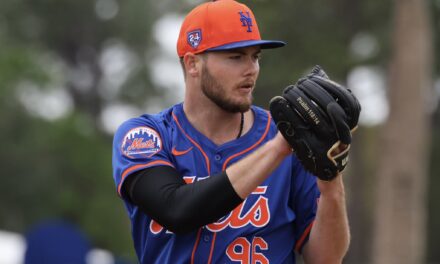On Tuesday, our own Ed Leyro posted a great piece which illustrated quite clearly how woefully deficient the Mets have been in producing an 18 game winner. In fact, they are on the verge attaining yet another dubious record; the longest drought in MLB history.
Since 1990, no Met pitcher has reached the 18-win mark in a single season and only Al Leiter has won as many as 17 games, doing so in 1998. (Pedro Martinez is the only 17-game winner for the Expos/Nationals franchise over the past two decades, winning that many games in 1997, when he won the National League Cy Young Award.)
Read the entire post, it’s well written with a lot of research, and I thought it was a real eye-opener.
So why has it been so difficult for this organization to produce an 18 game winner?
I came across a great post by Ben Lindbergh on Baseball Prospectus the other day. Lindbergh charts out the organizational discrepancies in minor league seasoning for pitchers. In other words, how many average innings pitched an organization will give their prospects before they are promoted to the Major Leagues.
How un-surprising are these results? The Mets were the most aggressive club in MLB when it came to promoting pitchers. Mets pitchers were called up to the majors with the least amount of minor league seasoning. Surprisingly, these results do not even include youngster Jenrry Mejia who was rushed before he even pitched 200 minor league innings last season.
Every team in the majors gave their prospects a minimum of 300 innings in the minor leagues except the Mets during this five year period which essentially covered the Minaya era.
It’s not just the pitchers.
The appalling trend held true with our young hitters and position players as well.
We all wonder why our prospects come up without any instincts for basic fundamentals – not running hard to first base – running amok on the bases – throwing to the wrong base – missing the cutoff man…
Well herein lies the reason – Not enough experience!
I always thought it was amazing how quickly Mets prospects would jump from Double-A to the Major Leagues in one fell swoop. The naive part of me looked at it as something good, but boy was I wrong.
If the name of the game is development, the Mets have been an epic and colossal failure in that regard.
They afford their prospects the least amount of time to develop and in doing so prevent these kids from achieving the lofty expectations that the organization places on them.
At 16 years old the Mets are already dubbing many of their kids phenoms and rushing them through the pipeline without any thought given to nurturing and developing their raw skills.
Instead the Mets have become quite adept at rushing them through the system (if you want to call it a system.), slapping a uniform number on their back, and trotting them out to the plate or mound as quickly as they could, often resulting in failure.
We’ve seen this time and time again including most recent examples Jenrry Mejia, Nick Evans and Fernando Martinez in the last three seasons.
Sometimes, these prospects can get by on their raw skills alone (like Ike Davis), but you can’t help but wonder how much better Pelfrey would have been with more seasoning and time to hone his craft. Would he have become the dominant ace every scout believed he would be when he was drafted?
This may be something or it may be nothing, but I’m holding firm to the belief that it’s a good reason why the Mets haven’t produced an 18-win season since Frank Viola – or had a rookie of the year in 27 years – or had an MVP in the history of their franchise.
Players who win a Cy Young or an MVP, are players who have reached their maximum potential and have exceeded all of their highest expectations. How can any Met prospect achieve either of those distinctions when they are not even afforded the luxury of developing their talent even at the most minimal level?
These kids need to play everyday and learn what it means to be a major leaguer. The more games they play the better the odds that they will experience all the different delicacies of the game while refining their baseball instincts.
They need to be nurtured like plants in a garden, affording them all the requirements needed for them to fully blossom and hit the road running. Repetition breeds a better understanding of the game and also instills confidence in a player.
Having a great draft every June is only a small part of building a solid minor league foundation. We need a philosophy that will give our team the quality minor league depth it needs to build a long-term strategy for winning and maintaining that level of success with a pipeline of major league ready talent.
For too many years, the Mets have been setting up their best prospects for failure instead of success.
I hope that this new regime preaches patience for our prospects so that we can finally start getting the best out of each of them, instead of their worst.














